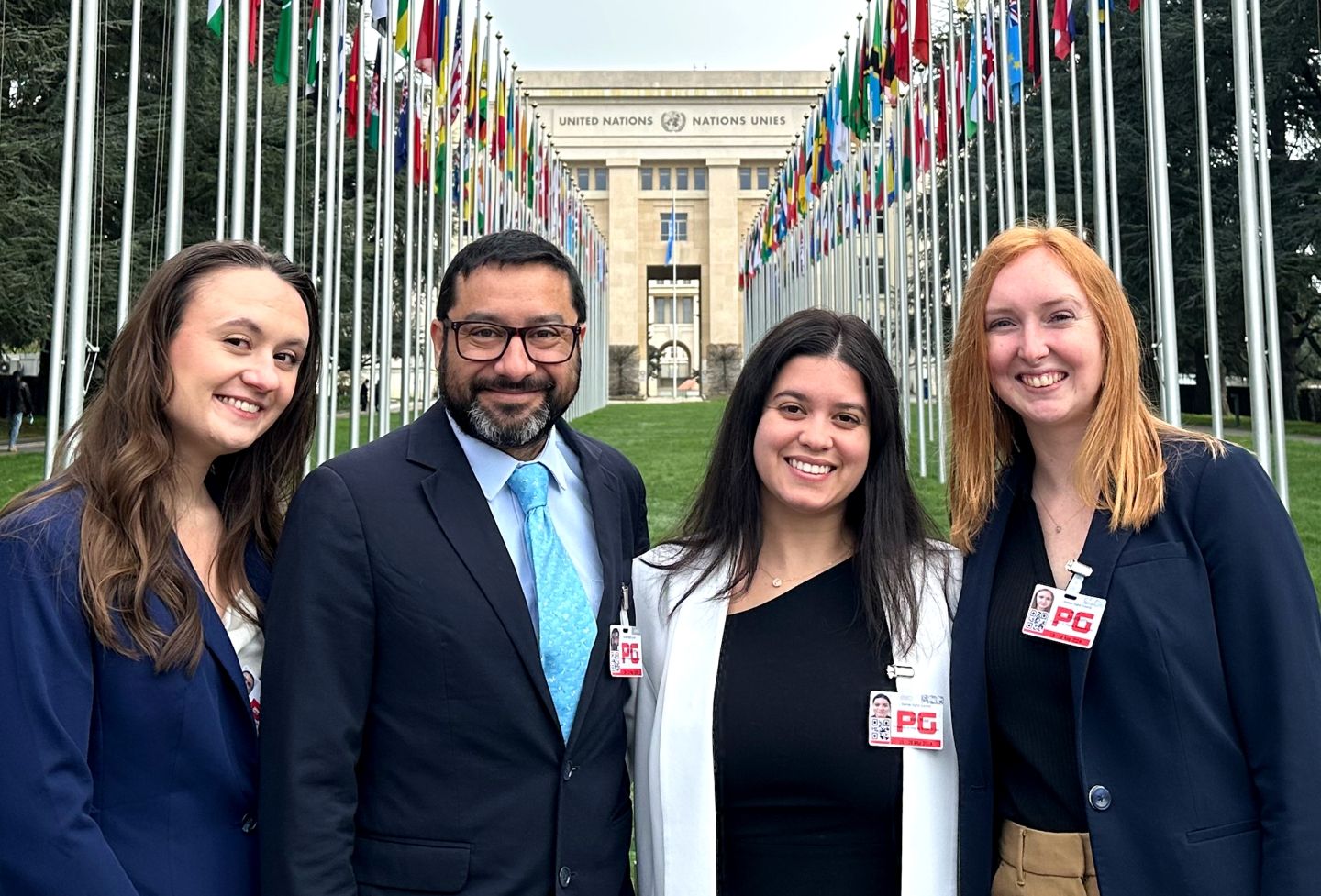As Russia’s war in Ukraine enters its 16th month, the United States and its allies have developed a range of sanctions to cut off Russia’s economy and strangle its ability to fight a war.

Ashley S. Deeks and Andrew Hayashi, two University of Virginia School of Law professors who specialize in international law and national security, and tax law and policy, respectively, recently teamed up on a research paper analyzing how the U.S. could use the breadth of its tax code to levy a different, nuanced type of sanction against Russia.
The two theorize that the United States could impose higher taxes on U.S. residents’ income from investments or activity connected to Russia, known as “outbound tax sanctions,” and on Russia-connected foreigners who earn income from the U.S., known as “inbound tax sanctions.”

Deeks recently served as White House associate counsel and deputy legal adviser to the National Security Council while on leave from the Law School. She is the Class of 1948 Professor of Scholarly Research in Law, a senior fellow at the Lieber Institute for Law and Land Warfare, and a faculty senior fellow at the Miller Center. Hayashi is affiliated with the Virginia Center for Tax Law at UVA and is a McDonald Distinguished Fellow at the Center for the Study of Law and Religion at Emory University.
Broadly speaking, what are some of the benefits of crafting income tax sanctions against certain countries?
A key reason U.S. sanctions have teeth is because so much financial activity happens using the U.S. dollar. Some policymakers worry that foreign governments may start to shift away from the U.S. dollar and toward other currencies to reduce their exposure to U.S. economic sanctions. One advantage to tax sanctions is that they would be less noticeable than, say, asset freezes. This means that they would be less likely to trigger moves away from the dollar. Another advantage of tax sanctions is that they can reach a very wide set of targets because they would affect the activities of anyone who is subject to U.S. income tax, while asset freezes are only effective against those who hold assets inside the U.S. Finally, tax sanctions could operate like a dimmer switch that you can turn up and down, depending on how strongly you want to disincentivize certain investments. Sanctions and export controls, in contrast, tend to be more “on or off.”
You describe an outbound tax that would essentially double tax some Americans living abroad and U.S. businesses earning money from certain states connected to Russia. Tell us more about that and how it would affect Russia’s ability to conduct war.
The purpose of an outbound tax sanction is to discourage U.S. taxpayers — businesses and individuals — from doing business and earning income in targeted countries. Americans supply states like Russia with their labor and financial capital when it is mutually beneficial to do so. By increasing the income tax on that activity, it encourages U.S. actors to take their labor and capital elsewhere. Depriving Russia of access to U.S. goods, services and financial capital increases the economic costs to Russia of its ongoing aggression in Ukraine.
Because of the complexity of the international tax rules, there are many ways of increasing the amount of tax paid by U.S. persons on income earned in a target state. One familiar way is to reduce the availability of credits for foreign taxes paid — leading to the “double taxation” issue. But we could also limit the availability of deductions or simply increase the tax rate applied to income earned in the target state.
Inbound tax sanctions would apply to foreign states, individuals or business entities investing in or doing business with U.S. entities. How could the U.S. leverage inbound taxes to further its foreign policy goals?
The U.S. currently imposes a 30% tax on investment income — such as interest and dividends — paid by U.S. businesses to foreign owners of U.S. stocks or bonds. (That tax rate is generally lower if the foreign owner is a resident of a country that has a tax treaty with the U.S.) Increasing the federal tax that foreigners owe on this income would impose costs on these investors that would encourage them to pressure their home countries to comply with U.S. foreign policy goals.
The U.S. is the biggest destination for foreign direct investment and by far the largest recipient of foreign capital. Because of how widely U.S. stocks and securities are held by foreign individuals and corporations, such tax sanctions can have a very broad reach.
Would a sanction like that hit wealthy Putin allies hard?
We can’t say with specificity because the identity of the beneficial owners of U.S. stocks and securities, for example, is in the hands of financial intermediaries. In some cases — for moderate tax sanctions — inbound tax sanctions may not seem to “hit” as hard as complete asset freezes because they are only a partial measure, simply taxing a greater share of the investor’s income. On the other hand, asset freezes only temporarily deprive the asset owner of access to her property, while tax sanctions permanently tax away some of the financial return on those assets. And we think that the partial nature of tax sanctions — the fact that they can be modulated — is an advantage because it leaves the government with flexibility to increase the tax sanctions in degrees.
Taxes can also generate information, as you describe in your paper. How can “tax intelligence” help the U.S. and perhaps be used as leverage against certain foreign countries?
We usually think about the Internal Revenue Code as a set of rules that tell us how to calculate how much we owe the government in taxes. But there are some provisions in the code that require taxpayers to report certain information that relates to foreign policy. For example, the code currently requires us to report whether we are doing business in a country that requires us to participate in a boycott the U.S. does not support. What this means is that if a country such as Qatar or Saudi Arabia requires a U.S. company to boycott Israel in order to do business in the country, the U.S. company must inform the IRS. This allows the Treasury Department to monitor the ebb and flow of pro-boycott attitudes. In another part of the code, Congress has required foreign banks to disclose information to the IRS about their U.S.-based account holders, which helps defeat tax avoidance by those account holders.
These are pretty narrow examples, but they give a good idea of the ways the U.S. can use the tax code to collect information on foreign policy, including information that might otherwise be hard for our diplomats on the ground to collect. Are U.S. subsidiaries abroad being asked to turn over information about dissidents or the phone logs of their employees? Are those subsidiaries systematically being asked to pay bribes? Tax sanctions that collect information could do good work here.
The U.S. and other countries levied a number of economic sanctions against Russia and people and institutions connected with Russia, including wealthy oligarchs. What lessons were learned?
Some of the sanctions are very traditional, such as freezing oligarchs’ assets, blocking transactions or restricting exports to Russian defense manufacturers. The U.S. and EU have also frozen Russian Central Bank assets in their territory and imposed price caps on Russia’s oil and gas exports.
We think tax sanctions might be harder to evade or defeat than some of those tools. Russia has continued to export oil and gas to India and China, which are not participating in the price cap, and there are reports that Russia has engaged in ship-to-ship transfers of crude oil to disguise the oil’s origin. Tax sanctions might be harder to evade, or at least U.S. actors subject to those sanctions may be less likely to try.
Sanctions often hurt the economies of the states imposing the sanctions. European states were very concerned about reducing the flow of Russian oil too dramatically, because they relied heavily on it. We think tax sanctions are attractive because they may impose fewer costs on states using them. Even when a coalition of states is firmly committed to halting Russia’s ability to sustain its war, economic interdependence and the need to balance punishment against self-harm means there is room for tools that allow for a nuanced response to economic activities.
Founded in 1819, the University of Virginia School of Law is the second-oldest continuously operating law school in the nation. Consistently ranked among the top law schools, Virginia is a world-renowned training ground for distinguished lawyers and public servants, instilling in them a commitment to leadership, integrity and community service.


